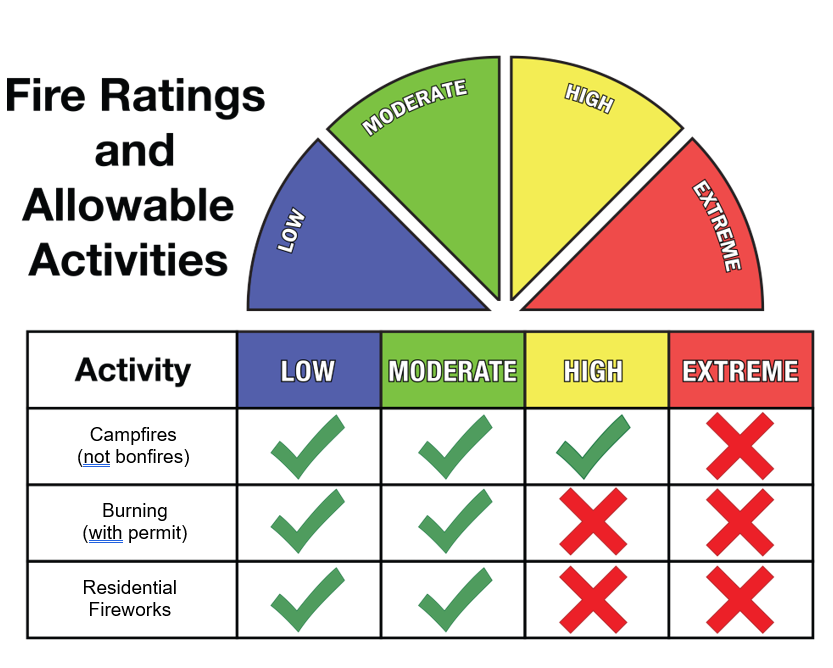

Clink this Link to view the MNRF “Forest Fire Info Map” https://www.lioapplications.lrc.gov.on.ca/ForestFireInformationMap/index.html?viewer=FFIM.FFIM
Fire Permits
Burning Permits are NOT required for SMALL CONTAINED CAMPFIRES. Remember to keep campfires to a small and manageable size (1 meter, or 3 feet, high by 1 meter in diameter) Don’t burn garbage in your campfire.
Burning Permits ARE required for INCINERATORS. They can be obtained by clicking the above link, calling or visiting the joint municipal office located at 903303 Hanbury Rd.
Burning Permits for UNCONTAINED OPEN AIR burning ARE required between April 1st and October 31st. Permits are free of charge and may be obtained clicking the above link or by calling the Municipal Office (903303 Hanbury Rd) during regular office hours.
In order to provide Fire Department Volunteers adequate time to inspect the requested burning location, please apply for your fire permit at least 3 business days before you plan to burn.
Volunteers
The Hudson Volunteer Fire Department is always looking for individuals interested in joining the fire department. If you are interested, please email the municipal office through our Contact Us page.
Fire Department meetings are held on the 1st and 3rd Monday of every month at 7:30 p.m. at the Hudson Fire Hall.
Smoke Alarms
Under the Ontario Fire Code, every home in Ontario is required to have working smoke alarms. Homeowners must ensure that smoke alarms are installed between sleeping and living areas. They are also required to maintain the smoke alarms in working order. In rental accommodations, the obligation to install and maintain smoke alarms in operating condition rests on the landlord. Landlords must also provide smoke alarm maintenance information to the occupant of each unit.
It is an offense for any person to disable a smoke alarm. This requirement applies equally to homeowners, landlords and tenants. Failure to comply with the smoke alarm requirements of the Fire Code can result in a minimum fine of $200.
Alarms do wear out; if its 10 years old or older – REPLACE IT!!!
For further information about smoke alarms, please refer to the below attachments, as well as contact the fire department.
Smoke Alarm Law
Maintain Smoke Alarm
Carbon Monoxide Detectors
It’s the LAW to have a working Carbon Monoxide Detector outside every sleeping corridor. Carbon Monoxide Detectors must be installed in any dwelling that uses fossil fuels (wood, gas, oil, propane). This law has taken effect as of April 15, 2015. For more detailed information on the Carbon Monoxide Detectors, please visit the fire marshal’s website at http://www.oafc.on.ca/public-safety or www.firstalerts.ca.
REMEMBER, the best line of defense is to protect yourself and your family even before the call to 911 is made; once the call is made, sometimes, it’s too late. Please make sure your Fire Alarms and your Carbon Monoxide Detectors are in working order and installed where needed. Homeowners should make a home escape plan and practice it every 6 months; it could save your lives.
BBQ Safety Tips
Always store and use your BBQ and tanks outside. Always light with lid open. Check lines and valves for leaks before lighting. Learn more at www.propane.ca.
Emergency Sirens
After the concern of some residents was made known to the fire department and council members the following decision has been made. If there is ever a fire emergency around the lake cottages and distant residents, the firefighters will sound their sirens to announce danger for residents to evacuate.

